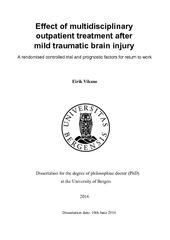| dc.contributor.author | Vikane, Eirik | en_US |
| dc.date.accessioned | 2016-09-07T12:13:24Z | |
| dc.date.available | 2016-09-07T12:13:24Z | |
| dc.date.issued | 2016-06-10 | |
| dc.identifier.isbn | 978-82-308-3310-0 | en_US |
| dc.identifier.uri | https://hdl.handle.net/1956/12747 | |
| dc.description.abstract | This thesis evaluates the efficacy of a multidisciplinary outpatient follow-up programme compared to follow-up by a general practitioner. Specifically, we explored the outcome and prognostic factors for outcome in patients with mild traumatic brain injury (MTBI). The majority of brain injury cases are MTBI, which has an overall favourable prognosis. However, a substantial subset of MTBI patients report symptoms and disability after injury. MTBI has been referred to as a “silent epidemic” because impairments in memory or cognition are often undetectable and its incidence is often underestimated. Cognitive problems together with physical, emotional and behavioural problems have an impact on participation and return to work (RTW). The current literature suggests education and reassurance as early interventions for MTBI after discharge from an emergency hospital. Multidisciplinary treatment is recommended for more complex cases of MTBI, but well-designed studies of the outcome and the efficacy of interventions in general and in promoting RTW in particular are still lacking. In our study, approximately 30% of the patients did not attend a planned followed-up visit from six to eight weeks post-MTBI. Patients who did not attend this follow-up visit had less serious intracranial injuries and were more likely to RTW than patients who attended their follow-ups. Among the patients who attended their follow-ups, 25% were sick-listed, and this result indicates a need for follow-up care after MTBI in this group of patients. We found that the multidisciplinary outpatient follow-up programme focusing on providing greater understanding and reassurance of a favourable outcome for MTBI did not improve RTW, but may have reduced the development of PCS in a vulnerable group of patients. For the group of patients with persistent symptoms at two months post-MTBI, having been sick-listed within the year prior to injury, being sick-listed at two months post-MTBI, exhibiting severe or moderate disability at two months post-injury (GOSE) and experiencing psychological distress (HAD) were negative predictors of RTW. These findings support the contribution of pre-existing and comorbid conditions to outcomes after MTBI. Our results indicate that subsequent intervention studies should consider a different approach to promote RTW. | en_US |
| dc.language.iso | eng | eng |
| dc.publisher | The University of Bergen | eng |
| dc.relation.haspart | Paper I: Vikane E, Hellstrom T, Roe C, Bautz-Holter E, Assmus J, Skouen JS. Missing a follow-up after mild traumatic brain injury-Does it matter? Brain Injury 2014; 28(11):1374-80. The article is not available in BORA. The published version is available at: <a href="http://dx.doi.org/10.3109/02699052.2014.919532" target="blank">http://dx.doi.org/10.3109/02699052.2014.919532</a> | en_US |
| dc.relation.haspart | Paper II: Vikane E, Hellstrøm T, Røe C, Bautz-Holter E, Aßmus J, Skouen JS. Multidisciplinary outpatient treatment in patients with mild traumatic brain injury: a randomised controlled intervention study. Brain Injury 2017; 31(4):475-484. The article is not available in BORA due to publisher restrictions. The published version is available at: <a href="http://dx.doi.org/10.1080/02699052.2017.1280852" target="blank">http://dx.doi.org/10.1080/02699052.2017.1280852</a> | en_US |
| dc.relation.haspart | Paper III: Vikane E, Hellstrøm T, Røe C, Bautz-Holter E, Aßmus J, Skouen JS. Predictors for return to work in subjects with mild traumatic brain injury. Behavioural Neurology 2016; Article ID 8026414, 10 pages, 2016. The article is availble at: <a href="http://hdl.handle.net/1956/12748" target="blank">http://hdl.handle.net/1956/12748</a> | en_US |
| dc.title | Effect of multidisciplinary outpatient treatment after mild traumatic brain injury: A randomised controlled trial and prognostic factors for return to work | en_US |
| dc.type | Doctoral thesis | |
| dc.rights.holder | Copyright the author. All rights reserved. | |
| dc.subject.nsi | VDP::Medisinske Fag: 700::Helsefag: 800 | en_US |
